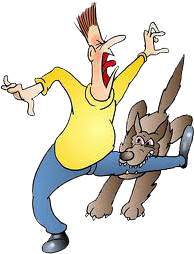Liability for Dog Bite Injuries
Friday, February 11th, 2011North Carolina law provides that the owner of a “dangerous dog” can be strictly liable for injuries from a dog bite under N.C. Gen. Stat. §67-4.4. In order to recover damages, the plaintiff must prove that the dog that bit them was a “dangerous dog.” N.C.G.S §67-4.1(a)(1) defines ‘dangerous dog’ as:
- A dog that:
- Without provocation has killed or inflicted severe injury on a person; or
- Is determined by the person or Board designated by the county or municipal authority responsible for animal control to be potentially dangerous because the dog has engaged in one or more of the behaviors listed in subdivision (2) of this subsection.
- Any dog owned or harbored primarily or in part for the purpose of dog fighting, or any dog trained for dog fighting. N.C.G.S. §67-4.1(a)(1)(d) provides exceptions for the following dogs from being classified as ‘dangerous dogs’ or ‘potentially dangerous dogs’ under the statute:

(1) A dog being used by a law enforcement officer to carry out the law enforcement officer’s official duties;
(2) A dog being used in a lawful hunt;
(3) A dog where the injury or damage inflicted by the dog was sustained by a domestic animal while the dog was working as a hunting dog, herding dog, or predator control dog on the property of, or under the control of, its owner or keeper, and the damage or injury was to a species or type of domestic animal appropriate to the work of the dog; or
(4) A dog where the injury inflicted by the dog was sustained by a person who, at the time of the injury, was committing a willful trespass or other tort, was tormenting, abusing, or assaulting the dog, had tormented, abused, or assaulted the dog, or was committing or attempting to commit a crime.
N.C.G.S § 67-4.1 provides that certain dogs may be classified as “potentially dangerous dogs” by a “Board designated by the county or municipal authority responsible for animal control.” N.C.G.S § 67-4.1(a)(2) also provides that the Board or a person should consider the following factors to determine if a dog is potentially dangerous:
- Inflicted a bite on a person that resulted in broken bones or disfiguring lacerations or required cosmetic surgery or hospitalization; or
- Killed or inflicted severe injury upon a domestic animal when not on the owner’s real property; or
- Approached a person when not on the owner’s property in a vicious or terrorizing manner in an apparent attitude of attack.
If a plaintiff is bitten by a “dangerous dog,” the owner of the dog may be held strictly liable for damages.
Negligence
Even if the dog is not determined to be a “dangerous dog,” one can still recover damages under the theory of negligence. To prove negligence, the plaintiff must show that the defendant was keeping an “animal with the knowledge of its viciousness.” Lee v. Rice, 154 N.C. App. 471, 472 (2002).
Under this theory, a plaintiff can recover compensation for their damages if they can prove two elements: “(1) that the animal was dangerous, vicious, mischievous, or ferocious, or one termed in law as possessing a vicious propensity; and (2) that the owner or keeper knew or should have known of the animal’s vicious propensity, character, and habits.” Lee v. Rice, 154 N.C. App. 471, 472 (2002). (quoting Sellers v. Morris, 233 N.C. 560,561 (1951).)
Negligence Per Se
Negligence per se may apply if the owner or keeper of the dog had violated a local ordinance or state law. In Swaney v. Shaw, the court found that ‘the violation of a statute which imposes a duty upon the defendant in order to promote the safety of others, including the plaintiff, is negligence per se, unless the statute, itself otherwise provides.’ 27 N.C. App. 631, 635 (1975). (quoting Ratliffe v. Power Co., 268 N.C. 605, 610 (1966).)
Many counties and cities have local laws regarding dangerous dogs. N.C.G.S. § 130A-200 provides that: “A local health director may declare an animal to be vicious and a menace to the public health when the animal has attacked a person causing bodily harm without being teased, molested, provoked, beaten, tortured or otherwise harmed. When an animal has been declared to be vicious and a menace to the public health, the local health director shall order the animal to be confined to its owner’s property. However, the animal may be permitted to leave its owner’s property when accompanied by a responsible adult and restrained on a leash.”
If you have sustained injuries after having been bitten by a dog or other dangerous animal, call Collins Law Firm for a consultation at 910-793-9000. We have represented victims of dog bites and recovered money damages for our clients, and we will be happy to talk with you about your case.
